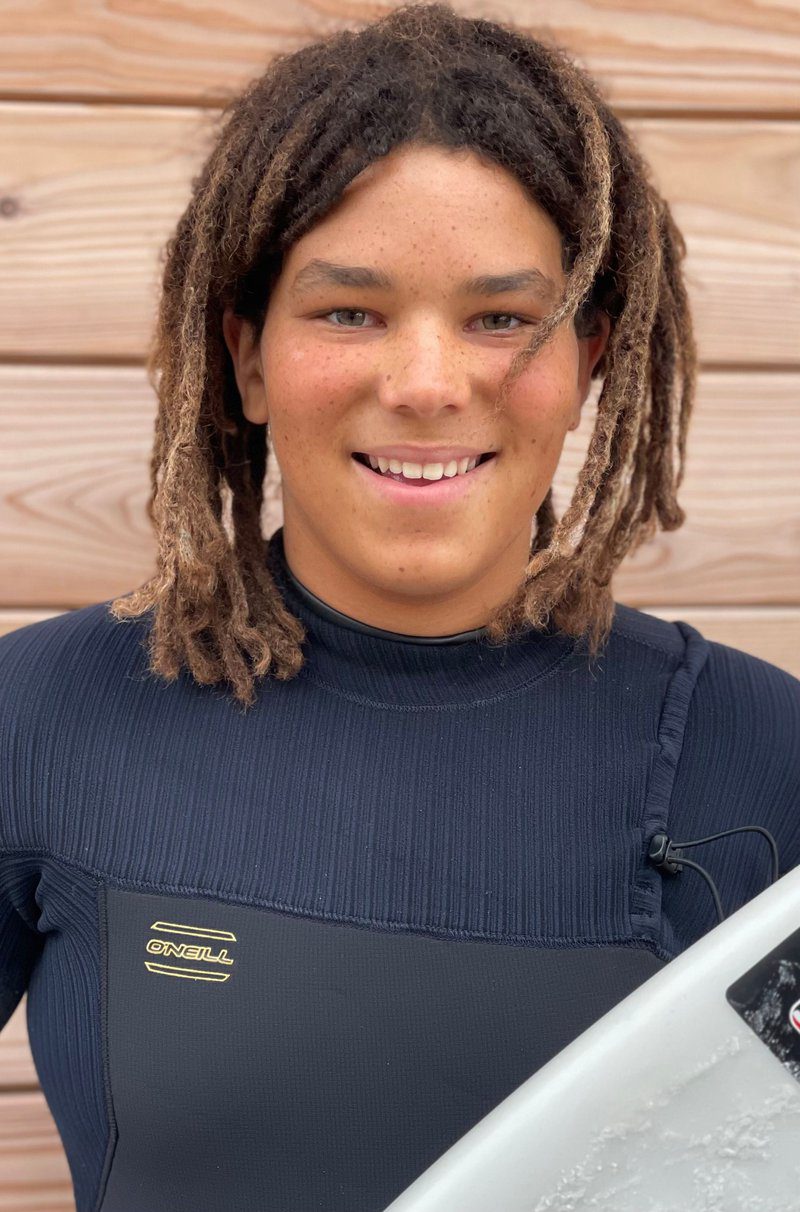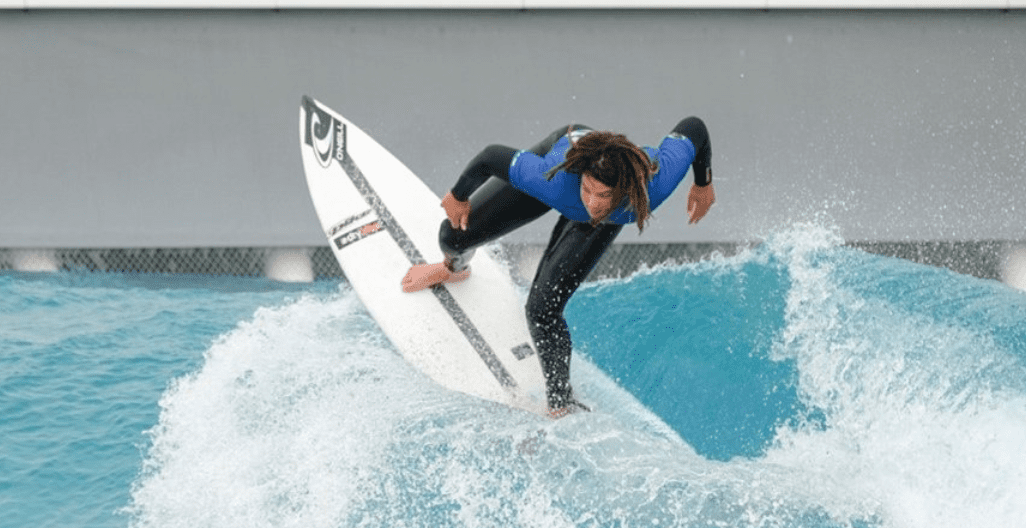Welcome to the team Siyanda!
The electric surfing 14-year-old goofyfooter Siyanda Hewitt is a rising talent in British waveriding and the newest member of The Wave ambassadors’ team. The power of the ocean runs deep through Siyanda’s family. His name is pronounced ‘Sea-anda’ and his parents Tom and Bulelwa are founders of the groundbreaking charities Surfers Not Street Children (and Umthombo Street Children) that use the power of surfing as a rehabilitation therapy to give kids from troubled backgrounds in South Africa and Mozambique a brighter future. British born Tom has been awarded an MBE for his trailblazing work, and the family are now based in the UK.
Siyanda is true a citizen of the world, raised in the sizzling waves of South Africa and Mozambique, and now a regular at the reefs and beaches of North Devon. The Wave caught up with Siyanda to find out more.
Tell us about the local scene where you surf?
We surf mostly at Croyde. It’s a really good wave, and I surf a lot with close friends Ziggy and Dylan Robinson and Noah Spooner. We all push each other, which makes it really exciting to surf together. It means a lot to me to have a good crew to surf with. I always had that growing up with the Surfers Not Street Children crew in Durban, and being part of a surf community that is strong and supportive is really cool. Me and Dad have also been getting up the coast in the winter to explore, and loving it.
How does surfing in the UK compare to growing up in South Africa?
It’s obviously colder and sometimes greyer here, but I’m so impressed with the quality of the waves in the UK. It’s so wave rich with all the limestone reefs and low-tide beaches. Probably over-all the waves are better and more consistent in South Africa, but I think the lifestyle is better here. Also, I think the schools are better. I’m at Braunton Academy and I really love Geography because you learn about the coastline, the weather and communities. In South Africa schools are really strict. That’s good for discipline, but it can be a stressful way to learn. Whereas here they are a lot more relaxed, which can be worse for discipline, but it definitely makes it a more enjoyable environment to learn in.
What special experiences and feelings does surfing give you that separates it from other activities?
Surfing is all about excitement. That’s what is so special about it - the unpredictability and not knowing what’s coming next as you paddle into the next set wave. And the more you go for it, the better surfing gets. Waves are never the same twice, and that’s what I love so much. With skating or biking you kind of know what’s coming because the park or the course stays exactly the same. But when surfing, every part of every wave is always changing, and you’ve got to work with that, react and make the most out of it. That’s the real rush of surfing, and the better quality the waves, the better the rush.
How did you find surfing at The Wave in Bristol?
Incredible. So stoked. It’s really great being in all the good energy there. Everyone is cheering each ride, and everyone is frothing to do something better each wave. It’s such a good place to surf with friends and push yourself harder and harder. Just the whole environment makes a really positive vibe. You really notice that no one is bringing the feeling of localism or bad energy that you can get at some breaks. I also think it’s so cool the way you can skate to the site from the parking area (as long as it’s not raining!). The whole lead up to arriving gets you so amped. It was good how they thought about this when they designed it.
Who are your surfing role models?
Brazilian Gabriel Medina is just so quick and efficient through every air and radical turn, so I get a lot of inspiration watching him in contests and through his video clips online. I also really like Australian Stephanie Gilmore. Her style is so pure and graceful and smooth, and the way she changes her feet position between turns is really interesting to watch. I got to hang out and surf with her in Mozambique when she was filming The Electric Acid Surfboard Test with Ashton Goggans and a crew from Stab magazine. She also visited the Surfers Not Street Children project there with me and Dad, which was cool. Mikey February is bringing a lot of positive vibes to South African surfing, which is really important as life can be really tough there for so many people. And Mikey’s style is really nice and effortless.
Tell us about your surfboards and some of the sponsors you’re now working with.
I’m pretty tall so I usually ride 6’2”s shaped by a really awesome Italian called Fabio Giacomini from Pike Surf. He has been shaping since 1980 and is based in South Africa and has done a lot of work with famous South African surfboard brands like Hurricane and Spider and Sawyer. Fabio is really great to work with. I also now have support from O’Neill, Dryrobe and The Foam Life, which I’m really stoked about.
Did you enjoy surfing’s Olympic debut?
It was really cool, apart from I missed the finals because I was surfing at The Wave, but watched them on replay. I think it was actually good to be in the ocean for the first ever time in the Olympics. The fact you don’t know what’s going to happen on each wave made it a real interesting contest, where paddling, reading the line-up, and form on the day was so important. In those situations, if you’re on a good run, you can go all the way to the finals. And I’ve been loving watching a lot of the other sports in the Olympics. It really gets you fired up to train hard with what you do and put the hours in. It’s amazing that Teahupo’o will be the surf spot for the Paris Olympics in 2024.
What are your surfing aims over the next few years?
I’m planning to enjoy more contests, here in the UK and hopefully over in South Africa at the Ballito Pro in Willard Beach up the coast from Durban. But I also really want to get back to freesurfing in Mozambique because it’s such a stunning coastline with incredible waves and we’ve been doing work there with Surfers Not Street Children.
Here in the UK I’ve actually been doing a lot of fitness training with Dad, which is helping so much with my surfing. But you do experience a lot of pressure when competing, so I really appreciate the stoke of freesurfing when you can joke around with friends and not have to be too serious. I really want to be a progressive freesurfer, and that can be really important when working with sponsors to standout alongside doing well in competitions. I also realise how lucky I am to have these surfing opportunities with sponsors and the chance to travel. I grew up at the Surfers Not Street Children project in Durban, so all the kids there became my close friends. Some of them have gone through a lot of really difficult times, especially lately, with the pandemic, with poverty and being forced into directions that don’t want to go. That experience has given me a lot of strength and resilience, and also awareness of how amazing the Surfers Not Street Children project is and why we do it. So for sure one of my big ambitions is to continue to promote this work with my family and be central to all the great things it can achieve. 
